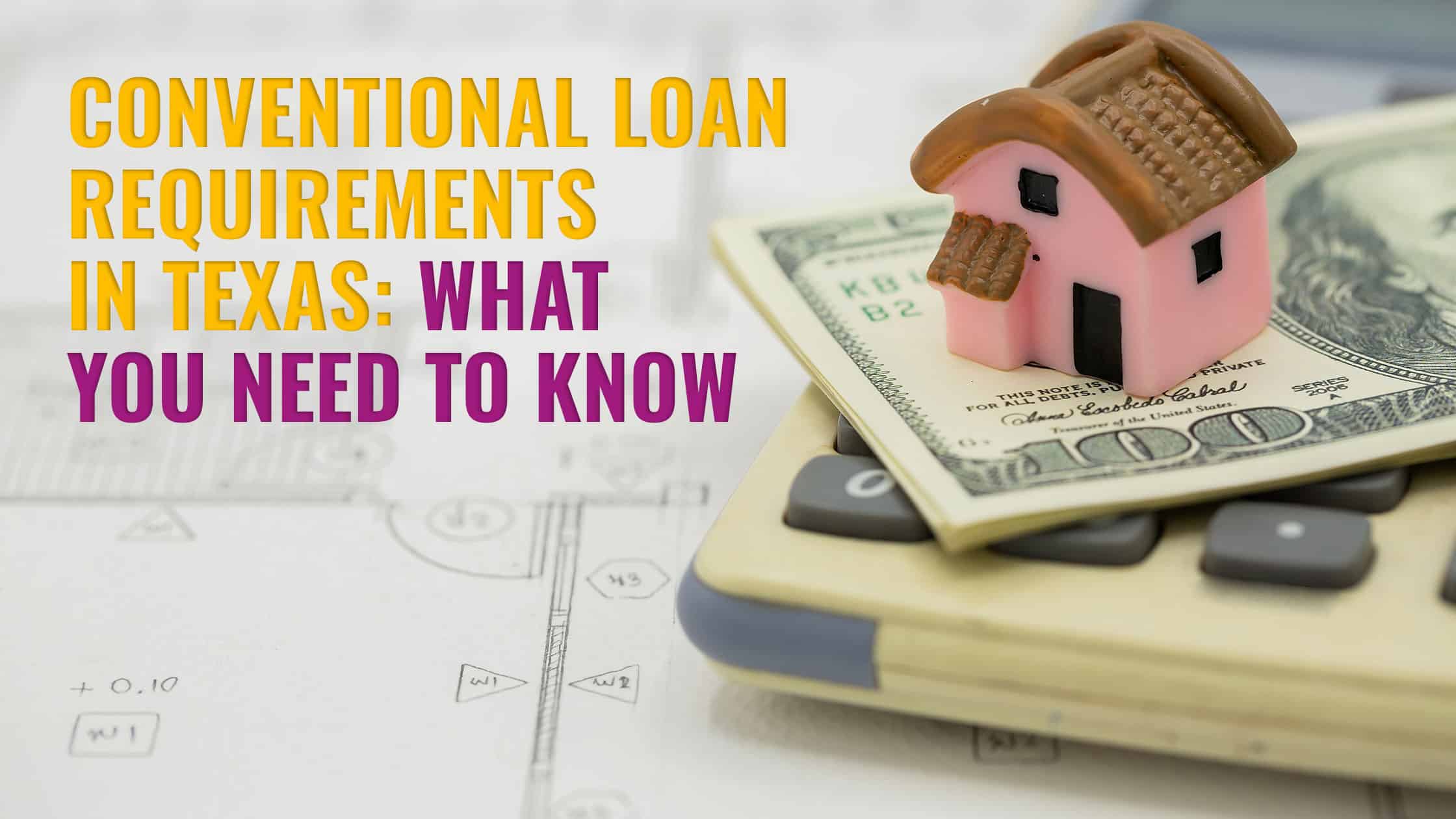Your Most Trusted Partner in Home Purchase Loans & Refinance Loans
Open Hours: Mon. - Fri., 9:00 a.m. - 6:00 p.m.

If you've been dreaming of owning a house in Texas, you can consider applying for a Texas conventional loan. This type of mortgage is ideal for homebuyers with a strong credit history and substantial savings. Opting for a conventional loan may be a cost-effective choice if you are financially secure.
If you will purchase your dream home this year, you could be eligible for a Texas conventional mortgage loan. To apply and meet the requirements for this type of loan in 2023, Ebenezer Mortgage Solutions is here to help!
Learn about the conventional loan requirements, Texas, including credit score and down payment requirements, so you can be prepared when applying for a mortgage. Get the information you need to know to make the process as smooth as possible.
A Texas conventional mortgage loan is a type of home mortgage that is not backed or insured by the federal government. Rather, these loans follow the guidelines set by Fannie Mae and Freddie Mac and are commonly referred to as "conforming" mortgages.
Conventional loans are generally considered to be less risky for lenders than government-backed loans, and borrowers typically need to meet stricter eligibility criteria, such as having a higher credit score and a larger down payment.
Since conventional loans conform to the standards of Fannie Mae and Freddie Mac, borrowers may be able to access more competitive interest rates and terms when applying for a conventional loan in Texas.
A conventional home loan in Texas offers several benefits to borrowers. Unlike government-backed loans, conventional loans provide more flexibility in terms of loan amounts, repayment options, and property types, making it easier for borrowers to find a loan that fits their specific needs.
Additionally, borrowers who can make a down payment of 20% or more may not need to pay for private mortgage insurance (PMI), resulting in significant savings over the life of the loan.
Conventional loans often have lower interest rates than government-backed loans, particularly for borrowers with good credit, which can also save borrowers money over the life of the loan.
Furthermore, conventional loans do not have an upfront funding fee, unlike government-backed loans such as VA and FHA loans, which can save borrowers thousands of dollars at the time of closing.
Finally, conforming conventional loans offer more refinancing options, making it easier for borrowers to take advantage of lower interest rates or other favorable loan terms.
Overall, a conventional home loan in Texas is a great option for borrowers who have good credit and substantial savings and are looking for a loan that offers flexibility, lower interest rates, and potential savings.
In Texas, conventional mortgage loan requirements can vary depending on the lender, but generally, they must meet certain guidelines set by Fannie Mae and Freddie Mac. These requirements include:
Additionally, the loan amount for a conventional mortgage loan must fall within the conforming loan limits, which are determined by the Federal Housing Finance Agency (FHFA) and are reevaluated annually.
In most areas of Texas, the conforming loan limit is up to $726,200, although it can be higher in certain high-cost areas. Meeting these requirements can help borrowers access more competitive interest rates and terms when applying for a conventional loan in Texas.
Contrary to popular belief, it's not necessary to have a 20% down payment to qualify for a conventional loan. In fact, some conventional loans can be obtained with as little as a 3% down payment.
In total, there are six main conventional loan options available in Texas that offer down payments ranging from 3% to 20%. This means that borrowers have some flexibility in selecting the loan that best fits their financial situation and goals.

Many prospective homebuyers mistakenly believe that qualifying for a conventional mortgage is difficult, particularly if their financial circumstances are less than perfect. However, this is not necessarily true.
Similar to government-backed loans, meeting the requirements for a conventional loan involves demonstrating that you have the ability to cover monthly mortgage payments, a stable income, sufficient funds for the down payment, and a solid credit history with a decent score.
While the standards for qualifying for a conventional loan may be slightly more stringent than for FHA or VA loans, they are still flexible enough for most homebuyers to meet. Therefore, with the right financial preparation and planning, many homebuyers can qualify for a conventional loan in Texas.
The average credit score for approved mortgage applicants is 744, which is more than sufficient to qualify for a conventional loan.
Most conventional loans require a minimum credit score of just 620. Lenders look for evidence that borrowers pay their bills on time and have demonstrated responsible financial habits.
Borrowers with slightly lower credit scores may still qualify for a conventional loan, but lenders may impose higher interest rates to offset the increased risk. Those with lower credit scores might consider applying for a Federal Housing Administration loan, which does not typically charge extra fees or higher rates for lower credit scores.
Before applying for a mortgage, it's a good idea to check your credit report to determine where you stand. This can help you identify any areas of concern and potentially take steps to improve your credit score.
As part of the mortgage application process, home buyers are required to provide proof of earnings, which may include documents such as 30 days of pay stubs, two years of W2s, and two years of tax returns for the self-employed. An offer letter may suffice for those who haven't yet started.
Lenders typically require two-year documentation to demonstrate consistent earnings. Alimony payments documented in a divorce decree and recurring automatic deposits are also considered. Seasonal income may be accepted with proof in a tax return.
Before a lender approves a mortgage, the home must be appraised to determine its fair market value. The appraisal must meet the agreed purchase price; otherwise, the home buyer can use it to negotiate a lower price, pay the difference out of pocket or add it to the down payment.
Property value is not the only factor considered in the appraisal, as sometimes the appraiser may require an additional professional's opinion. Conventional loans have less strict appraisal and property requirements than FHA, VA, or USDA loans, meaning that you can qualify for a home in worse condition and make the repairs after the loan is approved and you move in.
Conventional loan limits vary by location, with a nationwide starting limit of $726,200. However, in certain high-priced ZIP codes, Fannie Mae and Freddie Mac may allow loan amounts up to $1,089,300. Homebuyers should check the specific limit for their area if they need a loan amount above the standard limit. Loans that exceed conventional loan limits are known as non-conforming loans and require a jumbo loan instead.
Conventional loan eligibility is determined in part by the buyer's debt-to-income ratio (DTI). DTI compares a borrowers' gross income to their total monthly debts, including mortgage costs, to determine the size of the mortgage payment they can afford. While many lenders prefer a DTI of 36% or lower, conventional loans may accept a DTI of up to 43%. To calculate your DTI, add up your monthly loan payments, projected mortgage payments, and any child support or alimony payments, and divide by your monthly gross income (pre-tax).
Closing costs will involve charges such as the lender's origination fee and vendor fees like the appraisal, title insurance, and credit reporting fees.
Depending on the market strength and the willingness to close the transaction, a lender or seller may pay some or all of these costs.
Check with your lender to see if they offer lender credits and confirm that any seller contributions adhere to Fannie Mae and Freddie Mac's guidelines.
Seller contributions are typically limited to a percentage of the purchase price based on the down payment amount:
For rental or investment properties, the seller can only contribute 2% of the purchase price toward closing costs.
Are you in the market for a home and considering a conventional loan? Take advantage of the opportunity to get the best rates and terms available.
Contact us at Ebenezer Mortgage Solutions today to check your eligibility for a conventional loan. Our experienced mortgage broker in Texas will guide you through the process and help you find the right loan for your needs. Take the first step toward your dream home, and contact us now.
If you're ready to purchase your home, reach out to us immediately. For questions about home loans, whether it's conventional loans, FHA loans, or any other mortgage programs, we will be more than happy to answer them.
Call us today at (813) 284 - 4027, and let us start working on your mortgage application.
